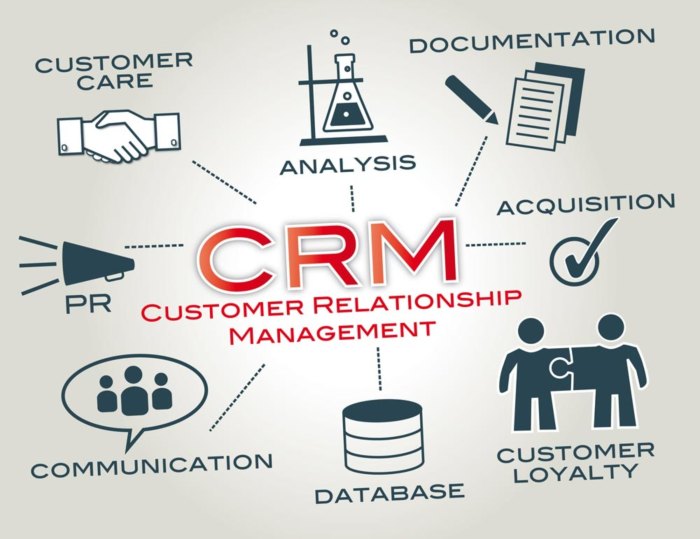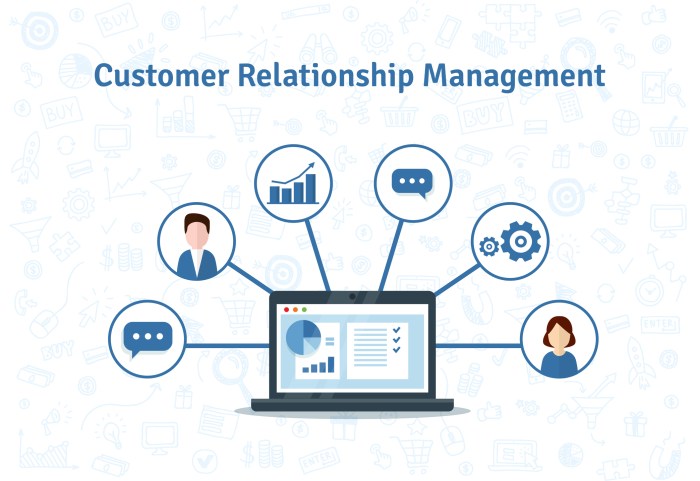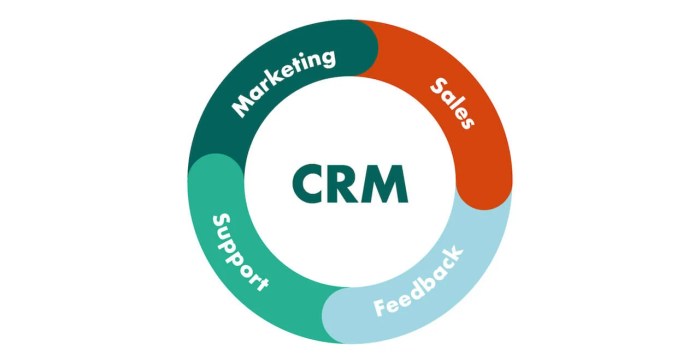In today’s competitive business landscape, maintaining strong customer relationships is paramount for small businesses to thrive. Customer relationship management (CRM) software has emerged as a powerful tool to help businesses manage and nurture these relationships effectively. This comprehensive guide will delve into the importance, features, benefits, types, and implementation of CRM software, empowering small businesses to make informed decisions about this essential investment.
CRM software offers a wealth of capabilities, from organizing customer data to automating marketing campaigns. By leveraging these features, small businesses can streamline their operations, improve customer satisfaction, and drive sales growth. With its user-friendly interfaces and affordable pricing options, CRM software has become an indispensable tool for businesses of all sizes.
Introduction
Customer relationship management (CRM) software is an essential tool for small businesses. It helps you manage your customer interactions and track their progress through the sales pipeline. By using CRM software, you can improve your customer service, increase sales, and build stronger relationships with your customers.
According to a study by Salesforce, businesses that use CRM software see a 29% increase in sales. Additionally, businesses that use CRM software are 50% more likely to retain customers.
Benefits of Using CRM Software
- Improved customer service
- Increased sales
- Stronger customer relationships
- Improved efficiency
- Better decision-making
Features of CRM Software

CRM software offers a range of features that can help small businesses manage their customer relationships more effectively. These features can be broadly categorized into four main areas: contact management, lead tracking, sales automation, and customer support.
Contact management features allow businesses to store and organize information about their customers, including their contact details, preferences, and purchase history. This information can be used to create targeted marketing campaigns, track customer interactions, and provide personalized customer service.
Lead tracking features help businesses identify and track potential customers. These features can be used to capture leads from websites, social media, and other marketing channels. Businesses can then use this information to qualify leads and move them through the sales pipeline.
Sales automation features can help businesses automate repetitive tasks, such as sending emails, scheduling appointments, and generating quotes. This can free up sales reps to focus on more strategic tasks, such as building relationships with customers and closing deals.
Customer support features can help businesses provide timely and efficient customer support. These features can be used to track customer inquiries, resolve issues, and provide feedback to the product development team.
Comparison of CRM Software Features
The following table compares the features of three different CRM software products:
| Feature | Product A | Product B | Product C |
|---|---|---|---|
| Contact management | Yes | Yes | Yes |
| Lead tracking | Yes | Yes | Yes |
| Sales automation | Yes | Yes | Yes |
| Customer support | Yes | Yes | Yes |
Benefits of Using CRM Software
CRM software provides numerous advantages for small businesses, empowering them to enhance customer relationships, boost sales, and streamline operations.
Improved Customer Relationships
By centralizing customer data, CRM software facilitates a comprehensive understanding of customer preferences, purchase history, and interactions. This enables businesses to personalize marketing campaigns, provide tailored recommendations, and resolve issues promptly, fostering stronger customer loyalty and satisfaction.
Increased Sales
CRM software empowers sales teams to track leads, manage opportunities, and nurture customer relationships. It provides real-time visibility into the sales pipeline, allowing businesses to identify potential roadblocks, prioritize prospects, and close deals efficiently. By automating tasks such as lead qualification and appointment scheduling, CRM software frees up sales representatives to focus on building relationships and driving revenue.
Streamlined Operations
CRM software integrates various business functions, eliminating the need for multiple systems and manual processes. It centralizes customer data, automates workflows, and provides a single source of truth for all customer-related information. This reduces operational costs, improves efficiency, and enhances collaboration across departments.
Types of CRM Software
CRM software can be classified into three main types based on deployment and accessibility: on-premise, cloud-based, and mobile CRM.
Each type offers unique advantages and suits different business needs. Understanding the differences between these types is crucial for selecting the right CRM software for your small business.
On-Premise CRM
- Installed and hosted on the company’s own servers.
- Provides complete control over data and customization.
- Requires significant upfront investment in hardware and IT support.
Cloud-Based CRM
- Hosted by a third-party provider over the internet.
- Accessible from anywhere with an internet connection.
- Typically offered as a subscription-based service.
- Less expensive than on-premise CRM but may have limited customization options.
Mobile CRM
- Designed specifically for use on smartphones and tablets.
- Provides access to CRM data and functionality on the go.
- Improves productivity and collaboration for field-based teams.
- May require additional setup and integration with existing CRM systems.
Choosing the Right CRM Software
Selecting the ideal CRM software for a small business requires careful consideration. Factors such as business size, industry, and budget play a crucial role in determining the most suitable solution.
Step-by-Step Guide to Choosing CRM Software
Follow these steps to ensure an informed decision:
- Assess Business Needs: Identify the specific areas where a CRM system can enhance operations, such as sales, marketing, or customer support.
- Determine Industry Requirements: Consider industry-specific features and integrations that are essential for your business.
- Establish Budget: Set a realistic budget that aligns with the size and capabilities of your business.
- Research and Compare Options: Explore various CRM software options, comparing features, pricing, and customer reviews.
- Consider Implementation and Support: Evaluate the ease of implementation and the level of support provided by the software vendor.
- Conduct a Trial: If possible, request a trial version to test the software’s functionality and user-friendliness.
- Make an Informed Decision: Based on the evaluation, select the CRM software that best meets your business needs and budget.
Implementing CRM Software

Implementing CRM software in a small business requires careful planning and execution to ensure successful adoption and maximize its benefits. Here are some best practices to consider:
Data Migration
- Plan a comprehensive data migration strategy to ensure seamless transfer of existing customer data from various sources into the CRM system.
- Clean and standardize data before migration to improve accuracy and data integrity.
- Test the data migration process thoroughly to identify and resolve any potential issues.
Training
- Provide comprehensive training to all users on the functionality and benefits of the CRM software.
- Conduct hands-on training sessions to familiarize users with the system’s features and workflows.
- Offer ongoing training and support to ensure continued user proficiency.
Ongoing Support
- Establish a dedicated support team to assist users with any issues or queries they may encounter.
- Provide regular software updates and maintenance to ensure optimal performance and security.
- Monitor system usage and user feedback to identify areas for improvement and optimization.
Case Studies
Case studies are an invaluable tool for small businesses looking to implement CRM software. By studying the experiences of other businesses that have successfully used CRM, you can learn from their mistakes and successes, and gain valuable insights into how to best implement CRM in your own business.
Here are a few case studies of small businesses that have successfully implemented CRM software:
Small Business A
Small Business A is a retail store that sells a variety of products, including clothing, home goods, and gifts. The store has been in business for over 10 years, and has a loyal customer base. However, the store’s sales had been declining in recent years, and the owner was struggling to keep up with the competition.
In 2020, Small Business A implemented a CRM software solution. The software helped the store to track customer data, including purchase history, contact information, and preferences. The store also used the CRM software to automate marketing campaigns and track customer interactions.
Since implementing CRM software, Small Business A has seen a significant increase in sales. The store has also been able to improve customer service and build stronger relationships with its customers.
Small Business B
Small Business B is a service-based business that provides consulting services to small businesses. The business has been in business for 5 years, and has a team of experienced consultants.
In 2021, Small Business B implemented a CRM software solution. The software helped the business to track customer data, including contact information, project history, and billing information. The business also used the CRM software to manage its sales pipeline and track customer interactions.
Since implementing CRM software, Small Business B has seen a significant increase in revenue. The business has also been able to improve customer service and build stronger relationships with its customers.
Conclusion

In conclusion, CRM software can be an invaluable asset for small businesses looking to improve their customer relationships and grow their business. By providing a centralized platform for managing customer data, automating tasks, and tracking interactions, CRM software can help businesses:
- Increase sales and revenue
- Improve customer satisfaction
- Reduce costs
- Make better decisions
If you are a small business owner, I encourage you to consider implementing CRM software. It could be the key to unlocking your business’s full potential.
Outcome Summary
In conclusion, CRM software is an invaluable asset for small businesses seeking to enhance customer relationships, boost sales, and streamline operations. By carefully considering the factors discussed in this guide, businesses can select and implement the right CRM solution that aligns with their specific needs.
Embracing CRM software empowers small businesses to stay competitive, adapt to changing market dynamics, and build lasting customer loyalty.

